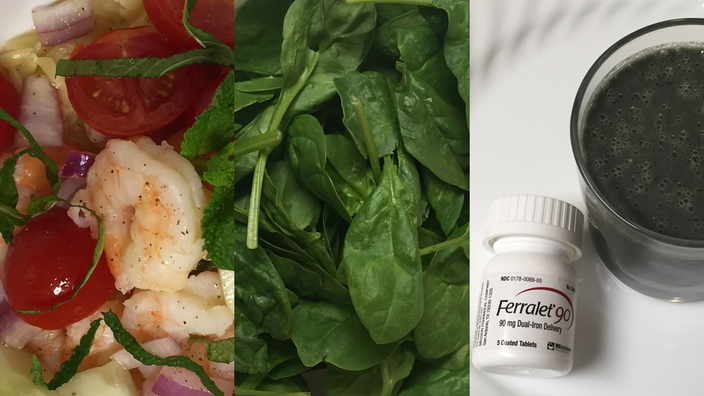
August 09, 2016
When I had the glucose tolerance test in my third trimester, I worried about being diagnosed with gestational diabetes. I did not have any real cause for concern; I simply wanted to know that my baby and I were healthy and all was continuing to go well with my pregnancy. I was lucky to learn that my blood sugar levels were fine, but the test revealed something I was not anticipating: My obstetrician told me that I have an iron deficiency.
My first thought was my baby’s health, so I asked if and how this affected him. I was reassured that he is fine because my iron levels are not dangerously low. My doctor was more concerned with my health, telling me that I would need to get my iron back up to normal before my due date because I will lose a lot of blood during delivery and in the days thereafter. I could feel myself starting to sweat as I processed this new information, but I stayed focused on asking more questions about combating and correcting my iron deficiency.
I was really surprised that I was receiving this diagnosis since my diet is pretty iron-rich and my prenatal vitamin includes an iron supplement. It did not make sense to me that I would have this deficiency, but I was reassured when I learned that one in three expecting mothers have iron deficient anemia. It is really common because, according to the Mayo Clinic, a pregnant woman’s iron stores need to serve our own increased blood volume as well as be a source of hemoglobin for our growing fetus.
My OB/GYN gave me an iron supplement pill called Ferralet 90 and asked if I frequently have children in my home. The U.S. Food and Drug Administration mandates a warning for all iron supplements, as accidental overdose of iron-containing products is a leading cause of fatal poisoning in children under 6 years old. My house is currently child-free, but if you have kids around, be sure to keep your iron supplements out of their reach.
Katie has focused on eating well throughout her pregnancy but since her iron deficiency diagnosis she is even more dedicated to her health. Spinach, shrimp, smoothies and supplements give her the extra iron she requires as she nears her due date.
I am also keeping a close eye on the amount of fiber I have daily to help combat constipation caused not only by pregnancy but also by my new supplements. The iron tablet I was given has a stool softener built in, but I was advised to eat plenty of fiber-rich food, continue to drink a lot of water, keep up my exercise routine and use MiraLax if I get really backed up. Many expecting mothers deal with constipation because of increased hormones and pressure on our GI tract from an expanding uterus. Unfortunately, for those of us with an iron deficiency, iron tablets make constipation even worse.
Symptoms of iron deficiency during pregnancy include weakness or fatigue, dizziness, shortness of breath, rapid or irregular heartbeat, chest pain, pale skin, cold hands and feet and difficulty concentrating. Pregnant women are usually checked in their first and third trimesters for iron deficiency, but if you experience any of these symptoms, you should speak with your obstetrician immediately to rule out anemia or another issue. I did not display any of the signs of iron-deficiency anemia, aside from feeling tired at times, so I am very glad that the glucose tolerance test picked up on this issue before it became a big problem.
I feel very lucky for a great pregnancy guided by smart, concerned physicians who are focused on my health and that of my baby. So many women around the world lack the health care that I receive. I am grateful that I have the knowledge and ability to address my iron deficiency and am committed to continuing to do everything I can for the health and safety of my baby boy. If you have any tips or advice about what you did or are doing to combat iron-deficiency anemia, I would love to hear your thoughts in the comments below.
 Katie Gagnon/for PhillyVoice
Katie Gagnon/for PhillyVoice